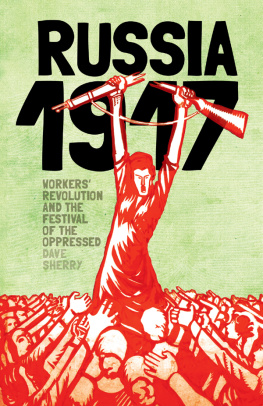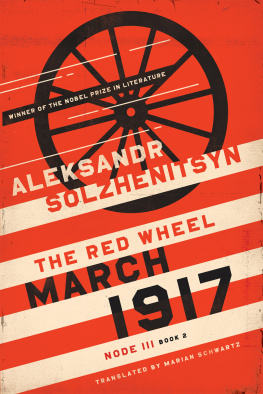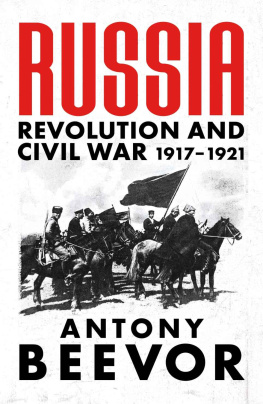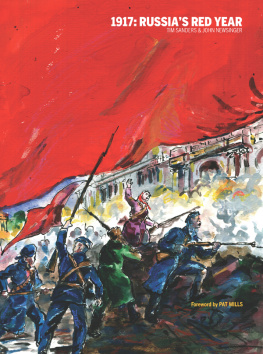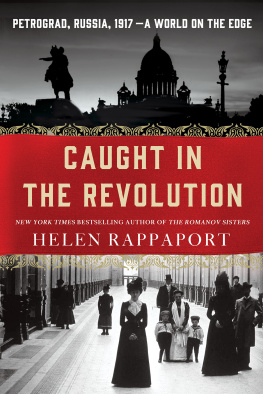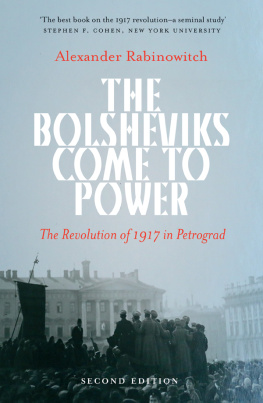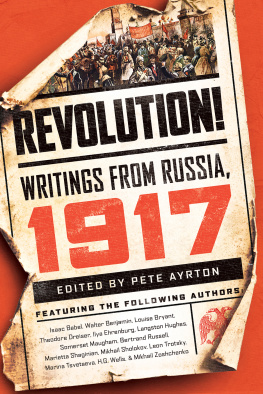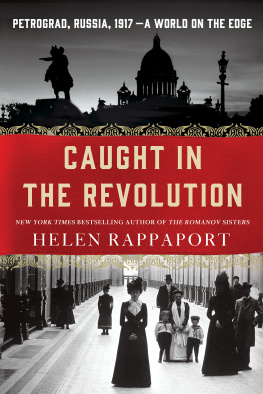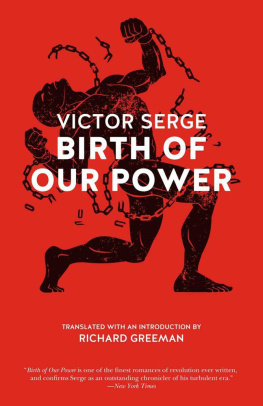Russia 1917
Workers Revolution and the Festival of the Oppressed
Dave Sherry
About the Author
Dave Sherry is a retired housing worker and trade union activist in Glasgow. He is the author of John MacLean: Red Clydesider (Bookmarks, 1998, republished 2014), Occupy! A Short History of Workers Occupations (Bookmarks, 2010) and Empire and Revolution: A Socialist History of the First World War (Bookmarks, 2014). He is a member of the Socialist Workers Party.
Russia 1917
Workers Revolution and the
Festival of the Oppressed
Dave Sherry

Russia 1917:
Workers Revolution and the Festival of the Oppressed
By Dave Sherry
Published 2017
Bookmarks Publications
c/o 1 Bloomsbury Street, London wc1b 3qe
Designed and typeset by Peter Robinson
Cover design Ben Windsor
Printed by Melita Press
ISBN 78-1-910885-40-6 (pbk)
978-1-910885-41-3 (Kindle)
978-1-910885-42-0 (ePub)
978-1-910885-43-7 (PDF)
Contents
Foreword
Names, dates and places
Russia
There is a problem about what to call Russia in the 20th Century. Before 1917 it was the Romanov Empire: what Lenin called a prison house of nations. It stretched from Finland, the Baltic States, Poland and Ukraine through the Caucasus and Central Asia to the nomadic tribes of Siberia in the far north and the Pacific Ocean in the far east. Centuries of imperial conquest by the Tsars had created a multinational state in which Great Russians were only 43 percent of its 150 million people.
From the 1920s to 1991 it was officially known as the Soviet Union or the USSR (Union of Socialist Soviet Republics). But by 1930 it was an empire under the control of a new autocracyStalins ruling bureaucracy in Moscow. By then it had ceased to be a federation of free republics and certainly not a workers state, let alone a socialist state. This was one of the reasons it broke apart in 1991.
The disintegration of this system in the late 1980s and its subsequent transition after 1991 has not been as fundamental as many commentators have suggested. Russia has shifted away from state capitalism towards a more market form of capitalism.
By the mid 1920s there were no soviets as there had been during the 1905 revolution and again from the moment the Tsar was toppled in early 1917 until after the end of the civil war in the early 1920s. With the triumph of Stalin, the Supreme Soviet and other bodies in Russia that included the word soviet in their official title, were in no way elected organs of workers power, unlike the workers, soldiers and peasants councils that had triumphed in October 1917. I have therefore tried to avoid using the terms Soviet Union and USSR, unless appropriate, to reflect the reality of the situation.
Stalinism
In using this term I am in full agreement with Alex Callinicoss definition, in The Revenge of History: By Stalinism I mean, not one persons rule or even a body of beliefs, but the whole system of social power crystallised in the USSR in the 1930s, exported to Eastern Europe in the second half of the 1940s, and that survived till the late 1980s when it began to collapse; a system characterised by the hierarchically organised control of all aspects of social life, political, economic, and cultural, by a narrow oligarchy seated at the apex of the party and state apparatusthe nomenklatura.
Petrograd/St Petersburg
The capital of Tsarist Russia is called St Petersburg when referring to the period before August 1914. Tsar Peter the Great founded the city in 1703 as his imperial capital. When Russia went to war with Germany in August 1914, Peters descendant Tsar Nicholas II had its German-sounding name changed to Petrograd during an outburst of anti-German hysteria.
British royalty responded in a similar fashion. King George V was a cousin of both Tsar Nicholas II and Kaiser Wilhelm. In 1917 he changed the family name from the German Saxe-Coburg and Gotha to Windsor; these are the royals and their acolytes who thunder on about our sceptered isle and Britishness. Queen Victorias parents were German: she was the Kaisers granny. In contrast the internationalist and anti-war Bolsheviks defied national chauvinism in 1914 by insisting on retaining the title of their Petersburg Committee.
After Lenins death in 1924 Petrograd was renamed Leningrad in honour of his role in the revolution. The embalmed Lenin would have been spinning in his tomb; he detested the cult of personality that was to become such a key feature of Stalinism and marked a sharp break from the revolutionary spirit of Bolshevism. In 1991 the citys original name was restored. By then Lenins reputation had nosedived because of the deliberate distortions promoted by the American secret intelligence services and by what passed for Western bourgeois scholarship: often the two were indistinguishable.
This, combined with the personality cult created by the Russian bureaucracy after his death, meant Lenin was posthumously and unjustly linked to the hideous crimes of Stalinism and the state capitalist regime that continued after the dictators death in 1953. Lenins fate must rank among the worst-ever cases of guilt by association.
Whites and Reds
In the civil war from the end of 1917 until the end of 1920, the counterrevolutionary forces backed by world capitalism were known as the Whites or the White Terror.
Dates
Until February 1918 Russia used the Julian or Byzantine calendar, which was 13 days behind the Gregorian calendar in the West. This is why the two revolutions of 1917 are referred to by the months of February and October. According to the Western or Gregorian calendar they took place in March and November. In this book the dates for the events of 1917 and early 1918 are the Julian ones used in Russia at the time. As Trotsky explained in his epic History of the Russian Revolution: The October revolution happened according to European reckoning in November The reader will be kind enough to remember that before overthrowing the Byzantine calendar, the revolution had to overthrow the institutions that clung to it.
This is a fairly chronological history, aiming to give a clear account with a discussion of context and politics as the revolution proceeds. It concludes with why the Russian Revolution matters today. Out of the bloodbath of the First World War, it opened up the prospect of a better world. Its message of international solidarity and working class selfemancipation sped round the globe. It showed that the highest ideals of humanity were practical and that the movement for achieving them had begun. Those prospects lasted far into the following decade and although destroyed under Stalinism, they still illuminate whats possible.
1917 is a portrait of ordinary women and men striving to end war and achieve human liberation. It serves to remind usat a time when we need remindingof what can happen in times of revolution, when the local and the immediate become merged with the national and the international, when people are filled with hope that all things are possible, not just for themselves, but for all humanity.
A Callinicos, The Revenge of History (London, 1991), p15.
Trotsky, The History of the Russian Revolution, Volume I, (London, 1967), pp19, 20.
Acknowledgements
Sally Campbell encouraged and guided me, organising the editing and production of this book along with Eileen Short and Carol Williams and I thank them for all their work. Martin Empson and Joseph Choonara read my initial draft and made a number of comments and criticisms from which the book has benefitted. Its shortcomings are mine, not theirs and I appreciate their help.
Next page
